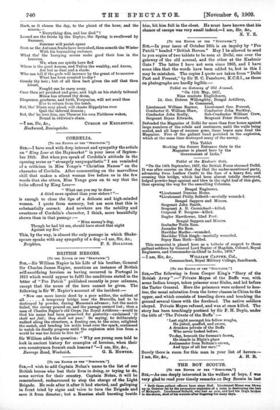BRITISH HEROES.
I TO THE EDITOR OP THE "Sriscreroa.°9 SIR,—Sir William Napier in his Life of his brother, General Sir Charles James Napier, mentions an instance of British self-sacrificing heroism as having occurred in Portugal in 1811 which would appear to fulfil the conditions stated in the letter of "Pro Patliti," published recently in your columns, except that the name of the hero cannot be given. The following is Sir W. Napier's account of the incident :- "Now one more heroic deed by a poor soldier, the noblest of' all A temporary bridge near the Marcella, had to be destroyed by powder, during M.assena's advance ; but the match failed, the enemy poured on, and the passage seemed lest; then a man of Charles Napier's old Corps, the Royal Artificers—would to God his name bad been preserved for posterity—exclaimed It shall not fail; they shall not pass.' So saying, he deliberately walked along the structure, a floating one, to the mine, relighted the match, and bending his noble head over the spark, continued to watch its deadly progress until the explosion sent him from a world he was too heroic to live in !"
Sir William adds the question : "Why are young men told to look in ancient history for examples of heroism, when their own countrymen furnish such lessons P "—I am, Sir, &c.„






























































 Previous page
Previous page